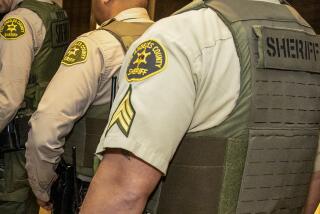Study Looks at Curfew’s Effect on Crime
- Share via
Curfews are hardly a new crime-fighting idea. In the 9th century, English King Alfred the Great ordered his subjects to cover their fires (the word curfew is derived from old English for cover and fire) and retire when the evening bell rang.
Now politicians nationwide have instituted youth curfews to curb juvenile crime or at least make points with crime-weary voters.
Just last week the Los Angeles Police Commission ordered curfews be enforced in Northridge and four other areas.
But is there any hard, scientific evidence that curfews really work?
“I was certain there had to be a study,” said Kenneth Reynolds, a doctoral candidate in urban affairs at the University of New Orleans. “I went to the library and started looking through the literature, I talked to people in the field.
“To my surprise, there was essentially nothing.”
Reynolds knew he had stumbled on both a good dissertation topic and a way to make a contribution to the field. He and William Ruefle, a professor at the University of South Alabama, are currently overseeing an 18-month study, funded by a $135,000 grant from the U.S. Department of Justice, meant to give public policy makers some hard evidence.
Attorney Jordan Budd, who recently argued a high-profile curfew case for the ACLU in San Diego, says an independent study is long overdue, no matter what the findings.
“Right now, there is just a lot of anecdotal evidence that fuels the debate,” Budd said. “If someone finds an anecdote that goes against their argument, they just ignore it and another is cited.”
Reynolds and Ruefle are studying New Orleans, which has the strictest curfew laws of any U.S. city. In reaction to a murder rate of nearly one per day, the city declared in 1994 that with few exceptions, everyone under the age of 17 must be off the streets on school nights at 8 p.m., and by 9 p.m. on summer weeknights.
Reynolds has just begun the number crunching needed to analyze crime during the period the curfew was most strictly enforced--the summer of 1994--compared to the 12 months before and after.
Ruefle said that New Orleans, like almost all cities with curfews, has the police resources to enforce it effectively for only a limited time. “In the first few months, New Orleans had 90 officers on curfew teams,” he said. “Now they have only two.”
Reynolds and Ruefle said they cannot discuss specific findings until after their work is submitted for review by fellow academics. But they said there have been surprises, especially while interviewing teenagers.
“Overwhelmingly they were in favor of the curfew,” Ruefle said. “They might think it was too strict--they said it began too early--and some didn’t like the way it was enforced. But no matter what socioeconomic group they are in, they are for it.”
Teenagers feel especially vulnerable, Ruefle said, because they’re the usual victims of violent juvenile crime.
“The kids in the public housing projects seemed to support the curfew even more strongly than those from the middle class and wealthier areas,” said Reynolds, who is 50 and returned to academia after a law enforcement career.
“I think perhaps that’s because they are more likely to have witnessed a violent crime.”
Another teen agreement: “In every group, they said the curfew should also apply to adults,” Reynolds said, laughing. “After all, they pointed out, it’s adults who commit most of the crimes.”
More to Read
Sign up for Essential California
The most important California stories and recommendations in your inbox every morning.
You may occasionally receive promotional content from the Los Angeles Times.














